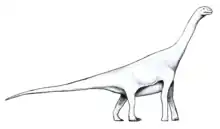1947 in paleontology
Paleontology or palaeontology is the study of prehistoric life forms on Earth through the examination of plant and animal fossils.[1] This includes the study of body fossils, tracks (ichnites), burrows, cast-off parts, fossilised feces (coprolites), palynomorphs and chemical residues. Because humans have encountered fossils for millennia, paleontology has a long history both before and after becoming formalized as a science. This article records significant discoveries and events related to paleontology that occurred or were published in the year 1947.
| |||
|---|---|---|---|
| +... |
Mosses
| Name | Novelty | Status | Authors | Age | Unit | Location | Synonymized taxa | Notes | Images |
|---|---|---|---|---|---|---|---|---|---|
|
Palaeohypnum[2] |
Sp nov |
jr synonym |
Steere |
Eocene |
A moss genus. |
||||
Archosauromorphs
Newly named dinosaurs
Data courtesy of George Olshevsky's dinosaur genera list.[4]
| Name | Status | Authors | Age | Location | Notes | Images |
|---|---|---|---|---|---|---|
| Amygdalodon[5] | Nomen dubium | Cabrera | Middle Jurassic Toarcian | * |
A sauropod known from some vertebrae, ribs, four complete and three partial teeth, and a partial pelvis and shoulder-blade. |  Amygdalodon |
Newly named pseudosuchians
| Name | Status | Authors | Age | Location | Notes | Notes | Images |
|---|---|---|---|---|---|---|---|
| Arizonasaurus[6] | Valid | Welles | Middle Triassic (Anisian) | A poposaurid. |  Arizonasaurus | ||
Synapsids
Non-mammalian
| Name | Status | Authors | Age | Location | Notes | Images |
|---|---|---|---|---|---|---|
| Kunminia | Valid | Young | Sinemurian | * |
||
Other Animals
| Name | Status | Authors | Age | Location | Notes | Images |
|---|---|---|---|---|---|---|
| Dickinsonia[7] | Valid | Sprigg | Ediacaran | A bilaterian of uncertain affinities | ||
| Papilionata | Synonym of Dickinsonia | Sprigg | Ediacaran | |||
References
- Gini-Newman, Garfield; Graham, Elizabeth (2001). Echoes from the past: world history to the 16th century. Toronto: McGraw-Hill Ryerson Ltd. ISBN 9780070887398. OCLC 46769716.
- LaMotte, R.S. (1952). Catalogue of the Cenozoic plants of North America through 1950. Geological Society of America Memoirs. Vol. 51. Geological Society of America. doi:10.1130/MEM51.
- Miller, N. G. (1980). "Fossil mosses of North America and their significance". The Mosses of North America. pp. 9–36.
- Olshevsky, George. "Dinogeorge's Dinosaur Genera List". Archived from the original on 2011-07-15. Retrieved 2008-08-07.
- Cabrera, A. 1947. Un sauropodo nuevo del Jurasico de Patagonia. Motas Mus. La Plata 12 Paleontol. 95: pp. 1-17.
- Welles, S.P. 1947. Vertebrates from the upper Moenkopi Formation of northern Arizona. University of California Publications Geol. Sci. 27: pp. 241-294.
- Sprigg, Reg C. (1947). "Early Cambrian (?) jellyfishes from the Flinders Ranges, South Australia" (PDF). Trans. R. Soc. S. Aust. 71: 212–24. Archived from the original (PDF) on 2007-09-29.